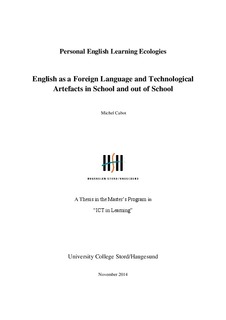| dc.description.abstract | Purpose and Research Question
The main purpose of this Master’s thesis was to map and analyse important learning ecologies of English learners at school and out of school. The main research question was: What role do digital and non-digital artefacts and ‘agency’ play in upper secondary students’ self-perceived trajectories of English learning ecologies in the past, present and future? Questions on artefactual (technology), interpersonal (pedagogy) and language learning (content) oriented ecologies provided essential information on the students’ personal English learning ecologies (PELE).
Method
This paper is based on a descriptive qualitative study. Focus interviews, in-depth interviews and member checking with three female and three male students of an upper secondary school in Western Norway were carried out. The first phase was explorative. The second phase consisted of constructed and analytical in-depth interviews with each student. In the third and last phase member checking was carried out six months later. Different coding methods were used to analyse the transcriptions.
Theoretical Framework
The current study was placed within a socio-cultural and ecological framework. The main emphasis was put on theories of agency (Emirbayer and Mische 1998, Biesta and Tedder 2006) and the distinction between temporal (the past, present, future) and relational (iterative, practical-evaluative, projective) dimensions. Another approach was Mishra and Koehler’s framework which was only used as an analytical tool to focus on the following three areas: 1. technology (types of artefacts and affordances: Gibson 1979, Salomon and Perkins 2005, Selwyn 2008); 2. pedagogy (the zone of proximal development and deliberate learning: Vygotsky 1978, 1986, Elgort 2011, Nation 2001, 2007); 3. content (productive versus receptive skills, input, interactionally modified input and output hypothesis: Krashen 1985, García Mayo and Alcón Soler, Swain 1985, 1995). Notions such as personal English learning ecology (PELE) regrouping artefactual, interpersonal and language oriented learning ecologies were introduced.
Conclusions
The findings of my study indicated that agency was created in the past with digital (e.g. Facebook, Instagram, Twitter, Snapshot, Minecraft, Call of Duty, League of Legends)
IV
and non-digital artefacts (e.g. vocabulary tests, the blackboard, homework), whilst the present and the future seemed to be mostly influenced by digital artefacts (e.g. League of legends, Minecraft, Kahoot quizzes, www.ordnet.no) (cf. appendix B). My enquiry revealed that playful artefacts were more predominant for male students than female students in the present. The expressive artefacts were more used by girls than boys. It is possible to assert that there was an evolution from a playful past to an expressive present in the case of the girls, and from an expressive past to a playful present in the case of the boys.
Deliberate learning in out-of-school contexts was infrequent in this study. It was only present at school and in semiformal contexts. Notwithstanding the fact that many informants declared not being interested in deliberate learning outside school, they did not comment negatively on deliberate learning at school and in semiformal contexts. The dichotomy “out-of-school learning” versus “in-school learning” did not seem to be always convincing when talking about learning ecologies. In many situations we had in-school learning out of school and out-of-school learning at school.
The informants’ English teacher played an important role within their learning ecology and the informants even enjoyed formal grammar teaching at the black board. All female students commented positively on vocabulary tests. Only the male students said that they developed more productive skills out of school. The English input was generally greater in out of-school learning. School was generally more important for the speaking skills of the female students. Writing skills were a challenge for all informants and were mostly initiated by the school teacher. It seemed that school was particularly important for the metalinguistic function of output. The hypothesis formulation and testing was of greater importance at home than at school only in the case of those students who either had English speaking parents or relatives or were used to gaming. Most ecological transitions or agentic moments in the informants’ self-perceived learning trajectories could be qualified as asymmetric interactions within their zones of proximal development. An important implication of my study is that school has a beneficial and complementary function related to out-of-school learning and that the capitalization of out-of-school learning is not necessarily a panacea for in-school problems. In the cases of writing skills, metalinguistic function of output and deliberate learning school has apparently even a compensatory function. | nb_NO |
